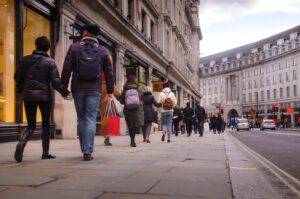Confidence among UK consumers has surged to its highest level in nearly three years, according to the latest GfK consumer confidence survey.
his positive shift suggests that families are recognising improvements in economic conditions as the six-week general election campaign begins.
GfK’s consumer confidence index climbed by two points to -17 in May, up from -19 in April. This is the highest reading since October 2021. The survey, conducted between May 1 and May 5, is likely to be leveraged by Prime Minister Rishi Sunak, who has made economic recovery a cornerstone of the Conservative Party’s election campaign. Since Sunak took office in October 2022, the index has risen by 30 points from a low of -47.
Economists closely monitor consumer confidence as an indicator of future household spending and larger asset purchases. The index is influenced by factors such as job security, real income trends, and economic growth.
According to GfK, there has been a significant improvement in households’ confidence regarding their personal financial situations for the coming year, reflecting a strengthening economy. Consumers are also increasingly optimistic about the economy’s growth prospects.
Recent figures from the Office for National Statistics showed a 0.6 per cent rise in GDP for the first quarter of 2024, pulling the UK out of a brief recession. The International Monetary Fund (IMF) also revised its growth forecast for the UK, predicting a 0.7 per cent increase this year, up from an earlier estimate of 0.5 per cent, indicating a potential “soft landing” for the economy.
Joe Staton, GfK’s client strategy director, commented: “With the latest drop in headline inflation and the prospect of interest rate cuts in due course, the trend in consumer confidence is certainly positive after a long period of stasis. Consumers are clearly sensing that conditions are improving, anticipating further growth in confidence in the months to come.”
Prime Minister Sunak announced a general election for July 4, amidst signs that the economy’s recovery from a short-lived recession and the cost of living crisis is taking longer than expected. Although inflation fell to a near-three-year low of 2.3 per cent in April, it declined more slowly than the Bank of England had forecast. Services inflation also edged down slightly to 5.9 per cent from 6 per cent, still above the Bank’s prediction of 5.5 per cent.
These inflation figures have led to warnings that interest rates may not be reduced until November. The persistent high inflation and cautious investor expectations for rate cuts have cast doubt on whether Chancellor Jeremy Hunt can reduce taxes before an anticipated autumn general election, prompting the decision to hold the vote in July instead.
Despite having lowered the rate of national insurance contributions by four percentage points over the past two fiscal events, the overall tax burden remains on track for a postwar high.
GfK’s consumer confidence index had previously plummeted to a record low of -49 in September 2022 following the ill-fated mini-budget of then-Prime Minister Liz Truss and Chancellor Kwasi Kwarteng, which included £45 billion of unfunded tax cuts. The controversial package, coupled with inflation concerns and rising interest rates, triggered chaos in the bond markets, necessitating emergency intervention from the Bank of England.
As the general election approaches, rising consumer confidence is a promising sign for the Conservatives, who aim to showcase the economic recovery under Sunak’s leadership.
Read more:
Household Confidence Peaks to Three-Year High Amid Economic Recovery

